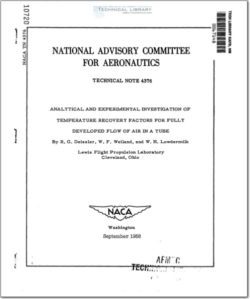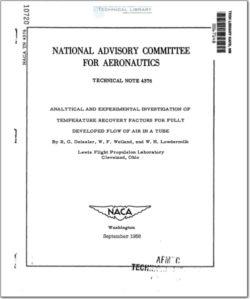NACA-TN-4376

- Version
- 148 Downloads
- 1.42 MB File Size
- 1 File Count
- March 24, 2016 Create Date
- March 24, 2016 Last Updated
National Advisory Committee for Aeronautics, Technical Notes - Analytical and Experimental Investigation of Temperature Recovery Factors for Fully Developed Flow of Air in a Tube

An analysis was made for predicting temperature recovery factors for
fully developed flow in a tube. Most of the attention was confined to
turbulent flow. Some qualitative results were obtained for laminar flow
by setting the eddy diffusivity in the equation for turbulent flow equal
to zero and using the incompressible parabolic velocity profile for lam-
inar flow. For zero Mach number the laminar flow results were exact.
Radial variation of properties was neglected in most of the calculations.
The effect of wall temperature gradient along the tube was negligible for
turbulent flow below Mach numbers of 0.9 and 0.98 for Reynolds numbers of
20,000 and 590,000, respectively. For laminar flow the effect became im-
portant at much lower Mach numbers.
Recovery factors were obtained experimentally for a range of Reyn—
olds, number from 630 to 50,000. Additional previously unpublished data
are presented for Reynolds numbers up to 650 ,000. The results indicate
that in the turbulent flow region the recovery factor is approximately
independent of Reynolds number. In the transition region for Reynolds
numbers between 2000 and 3000 the recovery factor is reduced abruptly to
a value lower than that obtained for the turbulent flow region.
Comparison of the predicted recovery factor with experimental data
indicated that the effective value of ratio of eddy diffusivities for
heat transfer to momentum transfer varies from 1 at a Reynolds number
of 5000 to 1.09 at a Reynolds number of 400,000. The ratio of eddy
diffusivities was also obtained from measurements of heat-transfer coef—
ficients and an analysis. Comparison of predicted with measured heat-
transfer coefficients indicates effective eddy diffusivity ratios slightly
less than those calculated from reCOVery factors.
The analysis substantiated the experimental result that correlations
for heat transfer without frictional heating can be applied to the case
with frictional heating by basing the heat—transfer coefficient on the
difference between the wall temperature and the adiabatic wall temperature
rather than on the difference between the wall and the fluid bulk
temperature.
| File | Action |
|---|---|
| naca-tn-4376 Analytical and Experimental Investigation of Temperature Recovery Factors for Fully Developed Flow of Air in a Tube.pdf | Download |

Comment On This Post